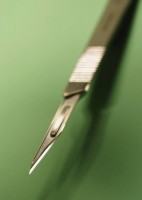The Support (or Lack Thereof) for Serial Debridement

Although many of us intuitively know that serial debridement works (we’ve seen the results), as healthcare professionals we must base our practice on evidence-based knowledge. I went searching for the evidence to support this practice and was surprised that I could not find reams of studies supporting serial debridement. If we know it works and many of us are doing it, where are all the studies that support it?
Modest Results from Serial Debridement, Need More Research
I found a good-sized study from 2009 on PubMed (Cardinal et al, 2009). In this particular study, the researchers retrospectively analyzed two controlled and randomized studies. The results revealed that there was a higher reduction in wound surface area following clinical visits involving serial debridement, compared to clinical visits in which serial debridement was not performed. In terms of diabetic foot ulcers, the numbers were less convincing; however, in both studies there were higher rates of wound closure in centers where serial debridement was performed more frequently. The researchers concluded that there seemed to be a modest increase in wound healing rates when serial debridement was performed, but they did hedge their results by stating that further research should be done to support their findings.
Venous Ulcer Serial Debridement Study
Surely there were more studies on serial debridement out there? I went searching again and found another (newer) study (Blumberg et al, 2012) in which the researchers set out to analyze the deep tissue derived from debridement of venous ulcers in order to correlate wound healing and pathologic findings. Results showed that venous wounds with deep fibrosis and high amounts of mature collagen were less likely to heal without debridement. The researchers recommended debridement of all venous ulcers to promote healing.
Despite Few Solid Studies, Ulcer Debridement Thrives
I searched some more and found many articles that talked about serial debridement within the article, but few that focused solely on proving that debridement is an effective therapy. Finally, as I was getting frustrated, I came across an online article entitled “Despite Few Solid Studies, Ulcer Debridement Thrives” (Groner, October 2012). The lightbulb went on and I heaved a sigh of relief- it wasn’t just me and a woeful lack of research skills. As Groner points out, many practitioners “wish debridement protocols were bolstered by better research. The rationale for the practice appears so sensible that no one is seriously suggesting it be abandoned pending better evidence; clinicians, however, would prefer to be able to back up their opinions with stronger documentation, particularly when choosing among approaches”.
The article is a very good read, and the resources at the bottom lead to many studies and articles that discuss debridement. As Groner’s article points out, no one is saying that we should not be debriding—it’s just that there is a definite lack of research in this area. This may be due to the fact that many studies are funded by wound care supply companies who don’t want to spend their money researching a procedure that may be more effective than the products they are trying to sell.
At any rate, should you come across any new research articles definitively stating that serial debridement if an effective therapy, please post your links so that other readers may enjoy them as well.
Learn More About Wound Debridement
We offer a comprehensive range of wound management courses to suit healthcare professionals across the full spectrum of qualifications and experience. Learn more about our wound care certification courses.
Sources
- Cardinal M, Eisenbud DE, Armstrong DG, Zelen C, Driver V, Attinger C, Phillips T, & Harding K. (2009). Serial surgical debridement: a retrospective study on clinical outcomes in chronic lower extremity wounds. Wound Repair Regen. 2009 May-Jun;17(3):306-11.
- Blumberg SN, Maggi J, Melamed J, Golinko M, Ross F, Chen W (2012). A histopathologic basis for surgical debridement to promote healing of venous ulcers. J Am Coll Surg. 2012 Dec;215(6):751-7.
- Groner, C. Despite few solid studies, ulcer debridement thrives. Lower Extremity Review, October 2012.

You could also turn this statement on edge–Debridement may not be as effective as some of the very advanced dressings such as Allevyn AG; debridement costs more; and may spread bacteria into deeper tissues if done by inefficient practitioner. Of course, in hospitals, we debride a lot in order to speed healing of the wound–surprisingly, patients who are in no shape to hold up to surgical or deep sharps debridement may still do better than expected with advanced dressings and no debridement.
All bets are off if the wound is infected–send ’em to surgery!!!
A very recently published study of over 300,00 wounds showed frequent debridement was associated with significantly faster healing time.
Wilcox JR, Carter MJ, Covington S. Frequency of Debridements and Time to Heal: A Retrospective Cohort Study of 312,744 Wounds. JAMA Dermatol. 2013 Jul 24. doi: 10.1001/jamadermatol.2013.4960
The Steed data from the regranex trials also showed the importance of debridement for diiabetic ulcers.
But here is the thing: the lack of “good data” in most cases just means the study has not been done. This is very different than doing the study and getting negative results.
Doing a good prospective wound study with IRB approval (usually necessary to get it published) could easily cost 50k to 100k dollars. Who is going to pay for that when it is already a standard of care and would never provide a payback for the study sponsor? So we are left with our best judgement and common sense…
You make a great point. Thanks for posting!